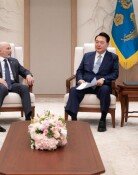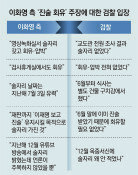Abe mentions lifting NK sanctions on day of Korea-China summit
Abe mentions lifting NK sanctions on day of Korea-China summit
Posted July. 04, 2014 05:06,
President Park Geun-hye and Chinese President Xi Jinping after their July 3 summit said together that they are firmly opposed to North Koreas nuclear weapons program. This is the first time such wording was placed in a Korea-China joint statement. The two leaders also agreed to complete bilateral free trade agreement (FTA) negotiations within this year. This leads to expectations of larger bilateral trade volume.
Park and Xi said in their joint statement announced immediately following their summit that they reconfirmed their stance of firm objection to the development of nuclear weapons on the Korean Peninsula. The Korea-China Future Vision Joint Statement announced when Park visited China in June 2013 said that the two nations shared the idea that [North Koreas] nuclear weapons development posed a serious threat to peace and stability in Northeast Asia and the world. The serious threat wording has become stronger to firm objections, thereby stepping up the pressure on North Korea. The July 3, 2014 joint statement also included the wording that the two nations agreed to the need to prepare conditions favorable to resuming the six-party denuclearization talks. Korea and China have issued clear objections to returning to the negotiation tables unless North Korea agrees without conditions to resume the talks. They contain the meaning that North Korea needs to take reasonable measures first in order for realistic progress in denuclearization, not dialog for dialogs sake.
Xi supported Parks Dresden Vision, which she revealed in Dresden, Germany in March. Although North Korea is against it, the Dresden three-point proposal included ways to resolve humanitarian issues, building infrastructure for co-prosperity and regaining a sense of common national identity on the both sides of the DMZ. In addition, the Chinese president said he respects the hopes of the Korean people for a peaceful reunification of the Korean Peninsula and that he supports the realization of that dream ultimately.
On Japan, which is becoming more conservative, deciding to tolerate exercising right to collective self-defense, etc., it said Korea and China had shared the idea that Korea-China-Japan collaboration could play an extremely important role in peace and co-prosperity in Northeast Asia, and avoided direct comment. Yet Korea and China pressured Japan in a roundabout way saying that in regards to the wartime sex slavery issue, Korea and China have agreed to cooperate in joint research of data.
Bilateral economic cooperation appears likely to gain steam. In regards to the Korea-China FTA where first-stage negotiations were completed in September last year, the two leaders said in their joint statement that they would step up efforts to strike an agreement until late 2014. That was the first time the point in time of concluding negotiations were specified in print. The two nations will hold the 12th round of negotiations in July this year.
Korea and China have also agreed to open a won-yuan direct transaction market. By agreeing to designate a Chinese bank as a yuan-clearing bank in Seoul, this would significantly cut currency transaction costs for Korean companies trading with their Chinese counterparts. Until now, the yuan was traded mainly in Hong Kong. China plans to bestow the RMB Qualified Foreign Institutional Investor II (RQFII) status to Korea, which enables direct investment of the Chinese currency earned from won-yuan direct transactions into the Chinese stock market. This should allow direct investments of up to 80 billion yuan (12.87 billion U.S. dollars).
They also agreed on greater bilateral exchanges, to establish high-level strategic talks in diplomacy and security as regular events. Also in the works is an establishment of youth leader forums between the two nations. Korea and China have agreed to increase bilateral human exchanges to 10 million by 2016 by designating 2015 as the Visit China year and 2016 as the Visit Korea year.







